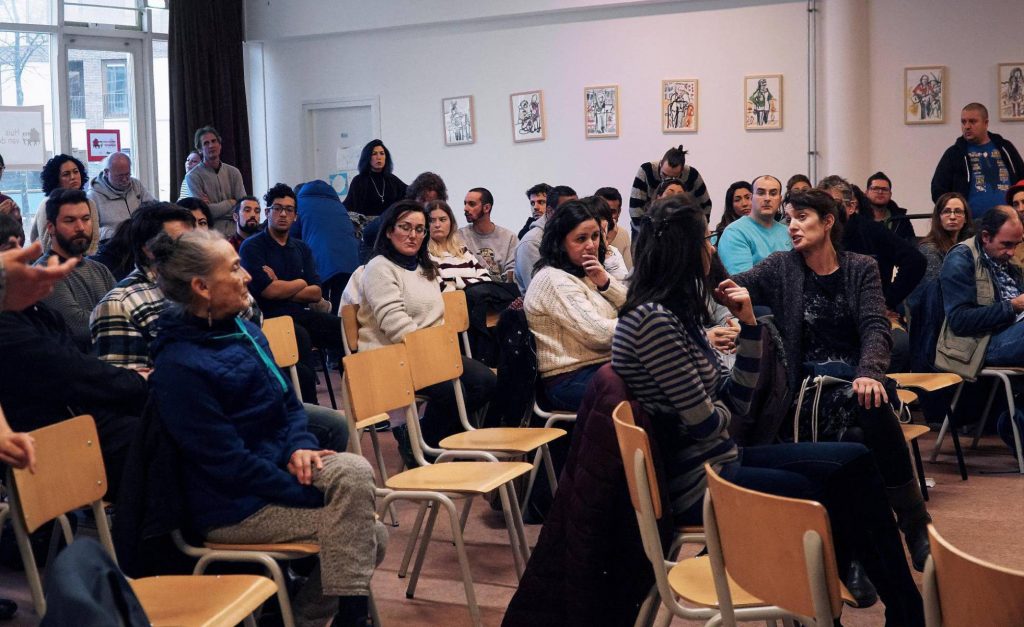Around 500 Spaniards have alerted the embassy about problems with the work schedules, wages and housing provided by temporary employment agencies.
With an unemployment rate of 3.5%, the Netherlands has become a European laboratory for the creation of flexible jobs for young workers. But the shadow of exploitation looms over its ability to attract temporary foreign workers, especially the unskilled ones.
Last year, the department of labor, migration and social security at the Spanish embassy in The Hague received 487 individual and collective complaints from citizens who were put in touch with Dutch temp agencies by Spanish recruitment companies. The working schedules, the wages and even the accommodation turned out to be a nightmare.
The Spaniards who filed complaints were selected by Spanish-Dutch recruitment companies such as Temporales and Covebo. The goal was to send workers to Dutch firms such as Post NL (a postal service), Bol.com (an e-commerce site), and Ingram Micro (an information technology wholesaler). The workers say the conditions they found were not what they had been promised.
“The pre-employment contract signed in Spain with Temporales for the Dutch company Tempo Team had no relation with the reality,” says Luis, 40, who went back to Barcelona after getting his hopes dashed. He says that under the deal he reached with the company, he would move to the Netherlands and live around 10 kilometers from his workplace. Instead, he and his colleagues were sent to a campsite in Lommel, Belgium, two hours away from Post NL, where their job was to unload packages.
“The bungalow was very small and two people would sleep in one room and another one on the couch. But it cost nearly €100 a week per person. The supermarket was three kilometers away and there was no Wi-Fi. I was taking distance learning courses, so I lost the admission money I had already paid. I didn’t get paid every week, and sometimes it would be two months before you saw a paycheck,” he says.
But the worst part, says Luis, was the aggressive attitude at work. “In this temporary work sector in the Netherlands, there’s been a lot of Polish workers for years. And maybe they viewed us as the competition,” he says.
Sources at the Spanish embassy note that pre-employment contracts like the ones used by Temporales or Covebo (known earlier as Pran) “are not legally valid, because there is no link between Dutch and Spanish legislation.” These sources say that those contracts typically offer around €1,600 a month, which is the minimum salary in the Netherlands for 40 hours of work a week. Approximately €400 goes into rent, another €100 into medical insurance and up to €100 in transportation expenses. Food is also at the worker’s expense.
“But the working schedule cannot be guaranteed. This is determined by the temp agency on the basis of what the Dutch company needs. The contracts are flexible and they include a clause that says the worker can be fired at any point. Everything depends on how much work there is,” adds the embassy source.
Managers at the temp agency Temporales said they are aware of 2% of the 500 or so complaints that affect them directly. In a telephone conversation, the company manager in Spain, Elena Lucas, said that the Dutch company Tempo Team guarantees 30 hours of work a week and 120 hours a month, and that if there is not enough work to do for lack of demand, the wages are paid anyway. “I’ve been sending people to the Netherlands for five years. It’s not easy to emigrate. But some of them don’t show up for work, the get high on marijuana and drive around in that state. Accommodation is found in houses in the city, and very occasionally at campsites,” she says.
Manuel Díez, from this same recruitment company, expresses it in a more direct way. “Feelings are one thing, and facts another. Most of those who lacked the patience to wait for their wages and complained to the embassy did not comply with the house rules at the place where they staying. Tobacco and drugs are not allowed, yet they smoke marijuana. If there are other kinds of problems, we work to solve them,” he says in a telephone conversation.
Ana, a 44-year-old from Cádiz, worked for Ingram Micro after getting recruited by Covebo, which sent her to a distribution warehouse. “The hardest part was that the temp agency treated us like we were lumps of meat,” she recalls. Ana says that she and her work colleagues lived nearly 90 minutes away from work, inside a “tiny” bungalow for three people located three kilometers from the nearest village.
“The intermediaries who dealt with things like housing and transportation were all Polish. And they’re the ones who were always high. The way they would speed down the road was because of the marijuana,” says Ana. “Also, you can’t get sick or you lose your job. I did get paid, but it didn’t feel like we were in the Netherlands, in the developed world in Europe,” she says.
Sources at Covebo said that all Spaniards arrive in the Netherlands with a signed pre-employment contract and are housed in regular buildings. “When there are special campaigns, like at Christmas for instance, we may use campsites because we get 300 workers all at once.”
Francisco Javier, a 33-year-old from Seville, also worked for Post NL and Ingram Micro, and he complains about the safety conditions at the campsite. “Drugs were being sold, and I was robbed. There was no security and no lighting, and there were constant brawls, especially among the Poles,” he says.
But things were not better at work. “The attitude was very bad. I was once refused entry, which is a form of abuse. I thought going to the Netherlands would be an unforgettable adventure, but I wasn’t even paid at the first job,” he says.
When these workers get recruited, they are presented with an image of the Netherlands as a country where everything runs smoothly and you earn more money if you work hard. “But when it comes down to the reality, the complaints build up and sometimes any excuse is good enough to fire them. The recruiter here cannot guarantee or coordinate anything in the Netherlands. However, back in Spain, where the tests and interviews take place, they give candidates the opposite impression,” says a source at the Spanish embassy.
Flexi-jobs
The problems with flexible jobs are the same for Spanish as for Dutch people. But the former have the added difficulty of accommodation, which is one of the main complaints from Spaniards who emigrated to the Netherlands for work.
“Flexibility is good for the employer, because if there is no work, the worker gets laid off without ceremony. The market trend is to try to convince people that a fixed job with greater security is a thing of the past, that change is where it’s at, but this manifestly comes with insecurity,” says Marianne Jekkers, of the National Union Federation of the Netherlands (FNV).
“Temporary work companies are not outside the law. And we unions are fine with flexi-work, but the bad part is the legal arrangements that end up taking away money and rights from workers,” says this unionist.
Eline Willemsen, who heads the department against labor exploitation at the Dutch non-profit Fair Work, recommends that Spanish workers really look at the conditions of the contract they are signing with the temp agency. “It might have nothing to do with the preliminary contract offered by the recruiter in Spain. And it is not always translated either. Sometimes it is written in English or in Dutch. The hyper-flexibility of the Dutch market is so patent that now even the government wants to regulate it a little. On the other hand, local authorities should coordinate the housing provided by the temp agencies, because mere compliance with living conditions guidelines is not enough,” adds Willemsen.
Source: https://elpais.com/elpais/2019/02/25/inenglish/1551082394_641037.html





